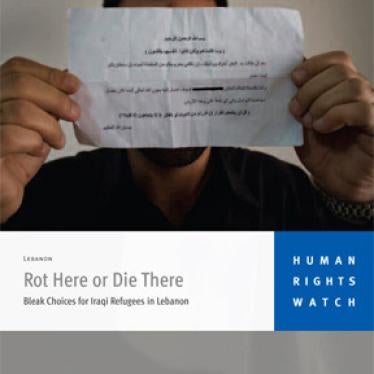In the past two weeks the Iraqi government has highlighted the return of thousands of Iraqi refugees from Syria. The government says that these returns are the result of the improving security situation inside Iraq. Throughout the Middle East Baghdad is broadcasting the message that it is safe for Iraqis to return. Furthermore the Iraqi government has laid on secure transport for returnees and is promising a resettlement package to those who go back.
Any improvement in the security situation in Iraq is to be welcomed. In the long run the Iraqi refugee crisis must be solved by the re-establishment of peace and stability in Iraq and the return of some 2.2 million Iraqi refugees to their country. But let's be clear about the reasons Iraqis are returning to Iraq. Reports of improved security and efforts by the government to encourage returns may be part of the story. But just as significant, or more so, is the increasing pressure that regional states like Jordan, Syria and Lebanon are putting on Iraqi refugees to go home.
It is not surprising that these states are keen to see the back of their Iraqi guests. These are poor countries which already host large numbers of Palestinian refugees from the Arab Israeli wars of 1948 and 1967. They know at first hand the dire economic and security consequences of inflows of long term refugees and they are struggling to cope with the strain the new arrivals are putting on their social and economic infrastructures.
The pressure on Iraqi refugees has increased significantly over the past year. Jordan not only systematically turns Iraqis without valid passports and visas back at its borders but it rounds up Iraqis, especially young males, and forces them back to Iraq. Syria, which had until recently adopted a remarkably relaxed attitude to Iraqi refugees, has now imposed tight new visa restrictions making it very hard for new arrivals to get in and putting additional pressure on those already in Syria to leave. Another push factor is that many Iraqi refugees, who are officially not allowed to work, are running out of funds to support themselves.
The push factors are starkly demonstrated in a report entitled "Rot Here or Die There" published by Human Rights Watch this week on the dire situation facing some 50,000 Iraqi refugees in Lebanon, most of them without legal status and in constant fear of arrest. 580 of them are now in detention. The Lebanese government is essentially offering these - and any others arrested in the future - a "choice" between indefinite detention in overcrowded Lebanese prisons and returning to Iraq.
"No one tells me how long I am going to be in prison," an Iraqi refugee sitting in Roumieh Prison in Greater Beirut told Human Rights Watch researchers. "If I go back to Iraq, I will be killed. I don't want to go back, but it is better for me to go back than to spend one more day being locked up with criminals."
Like Jordan and Syria, Lebanon does not have a refugee law. It treats most Iraqis as illegal immigrants, regardless of their need to be protected as refugees. Those who are caught at Lebanon's numerous checkpoints are subject to imprisonment and fines. But, after they serve their prison sentences for being in the country illegally, most can secure their release only by agreeing to return to Iraq.
The UK has done little to relieve the refugee burden in the region. Under intense pressure from the media and non-governmental organisations, including Human Rights Watch, Whitehall recently announced a package of support, including the option of resettlement in the UK, to Iraqis who face persecution and death because of their work with the British forces in Iraq. But, while militias continue to target current and former employees of the British in Iraq, the implementation of this new policy is bogged down in bureaucratic inertia.
Meanwhile the government continues its policy of turning down most applications by Iraqi asylum seekers who have made it to the UK. Worse, the UK government has resumed forcible returns of failed asylum seekers to northern Iraq - a policy which sends a clear message to the regional states that their hard line attitude is acceptable.
Resettlement can save some individuals, but more comprehensive support is needed for the vast majority of the estimated 4.4 million Iraqis displaced inside Iraq and in neighbouring countries. So far the UK's humanitarian spending to address this crisis has been wholly inadequate, a mere 15 million pounds, a tiny fraction of the billions it has spent on the military effort in Iraq.
Together with the US, the UK government should acknowledge its responsibility toward Iraqi refugees because of its military intervention in Iraq. But until now it has not even taken elementary steps to assist Iraq's neighbours to deal with the crisis, nor to convince them to keep their doors open to refugees whose lives are in danger in Iraq.








